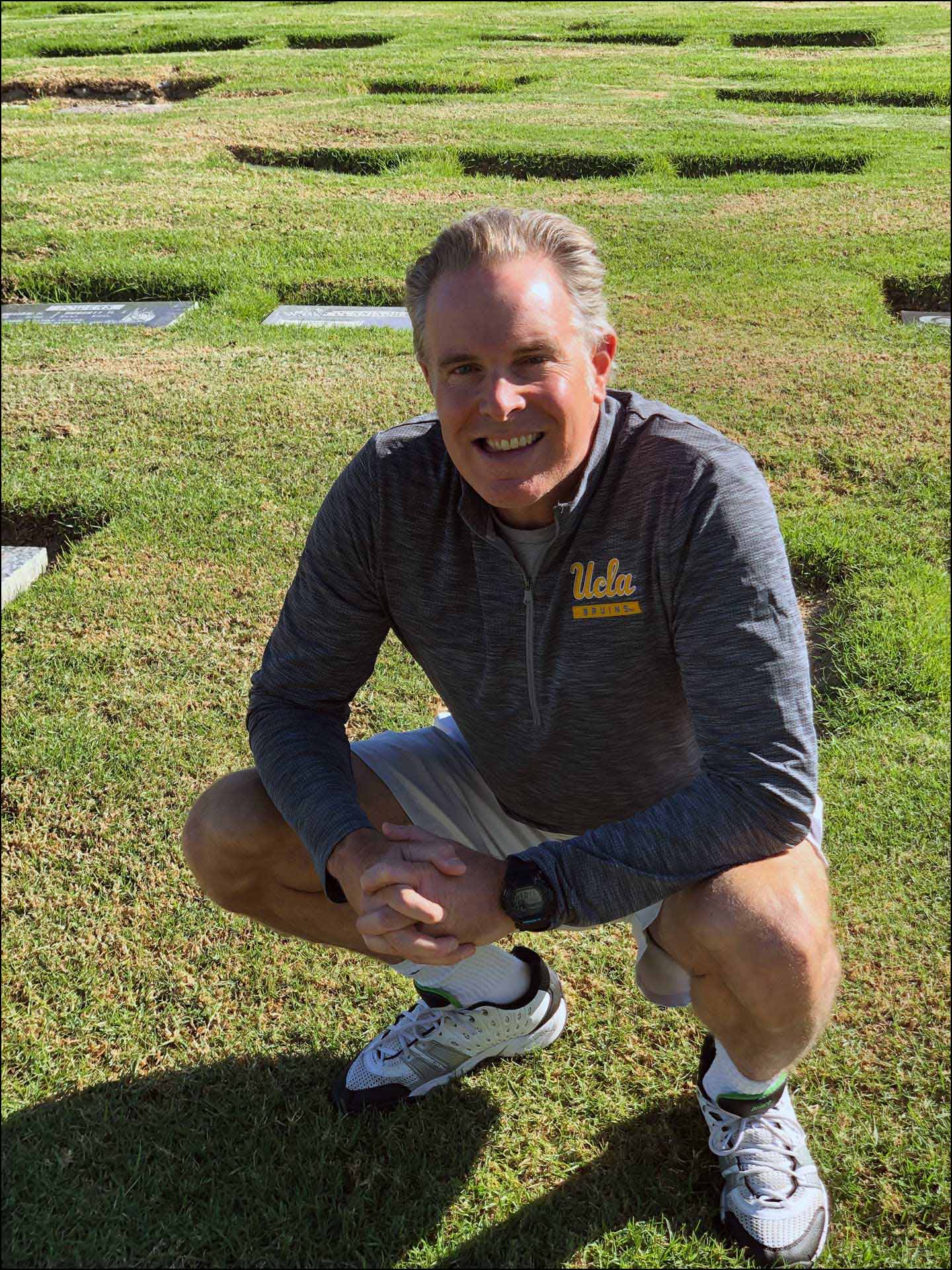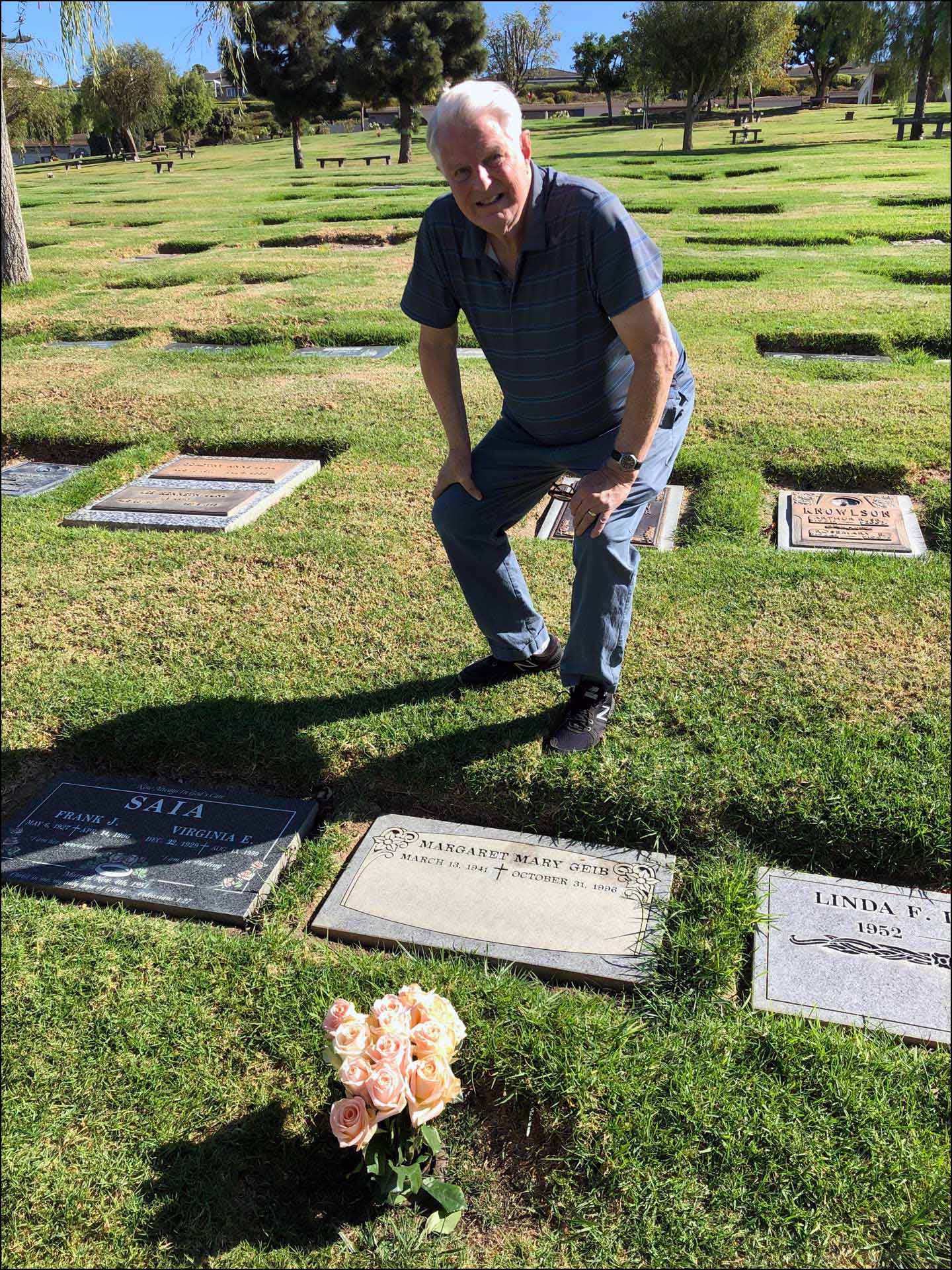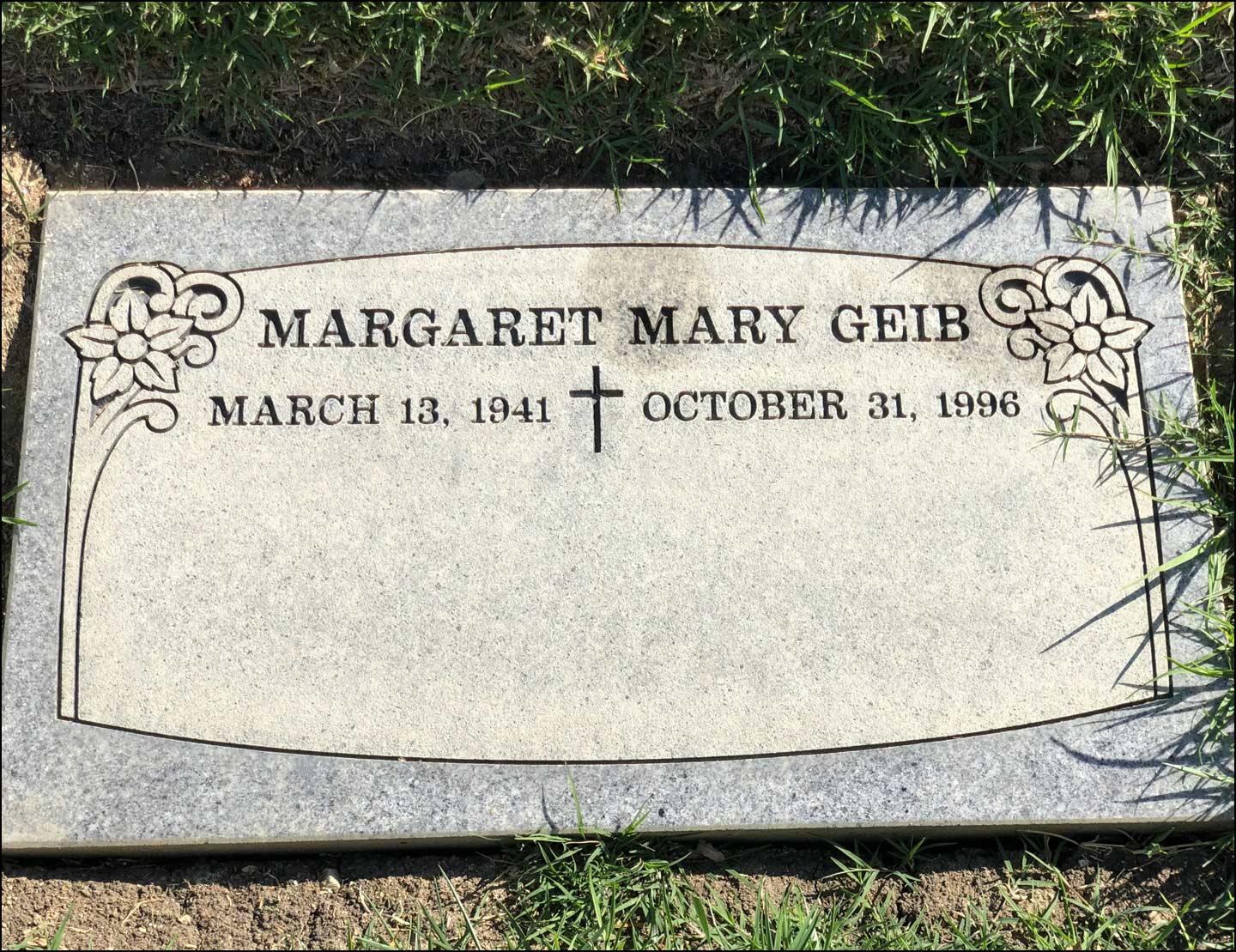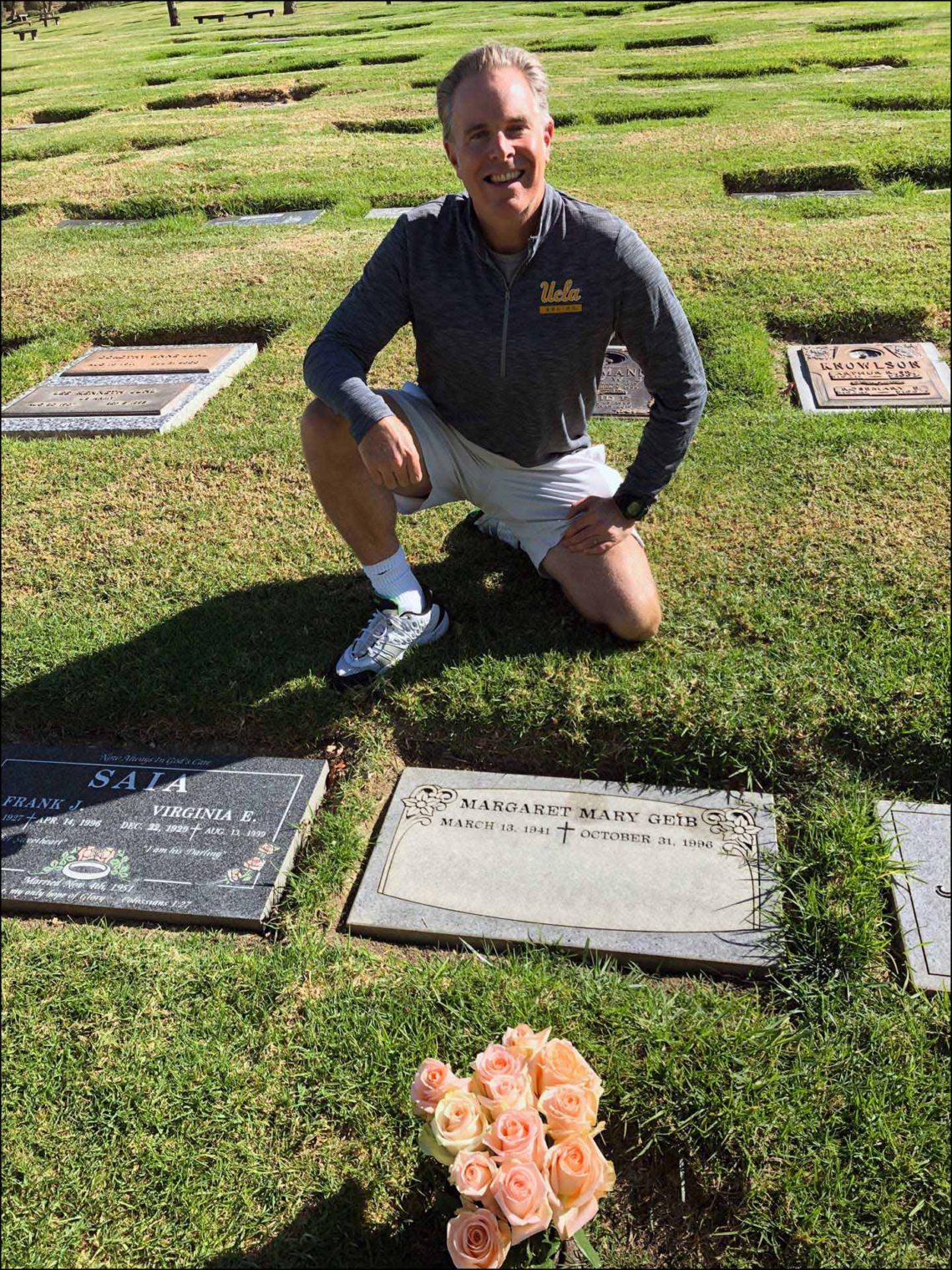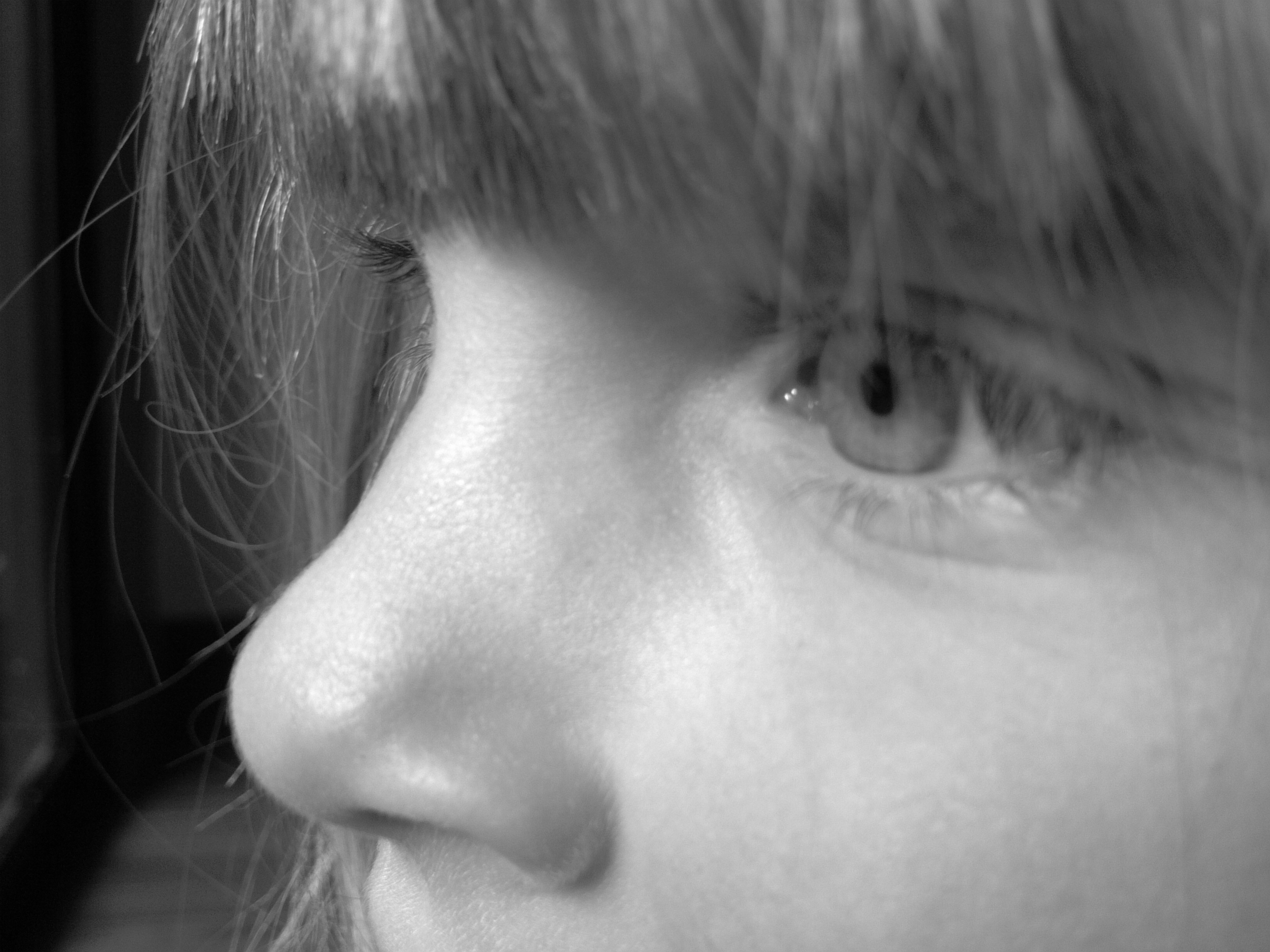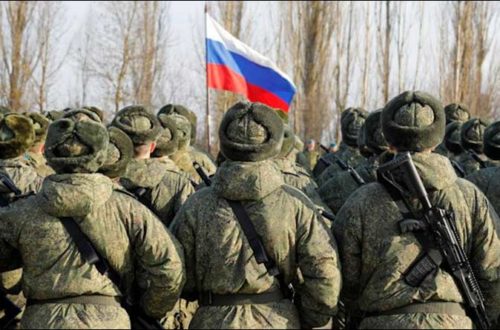Dear Mom,
Hello.
It is the 23rd anniversary of your death, and your husband and I visited your grave to pay our respects and leave flowers for you.
It was a beautiful day, this October 31, 2019. Although you died at 56-years of age — decades before you should have — your peers are beginning to catch up with you. Left and right persons of your generation are struggling with health problems or succumbing to them. Walking near your grave I ran across Sylvia M.’s grave, and Trudy’s is freshly installed and waiting for her. Family friend Sharon M. is buying a grave for her husband Frank who is dying of bladder cancer. The Pacific View Mortuary & Memorial Park is starting to fill up with your friends and acquaintances. Your friend Barbara B., after a long decline, supposedly can no longer walk because of edema in her feet. Dad and I ran into Penny M. in the store and I almost did not recognize her: Penny’s face is a crumbling edifice, as old age has fallen ruinously upon her. She is so old that not only is she in poor health but her son in middle age is in poor health. We are all of us much older than we once were. Your husband, my father, is in overall good health, but there are worries here and there. These will likely not get better with time. They will get worse. So it goes. We get old and die. You died before you got old, tragically.
I have given so much thought to how we die. One can die suddenly and quickly, with no pain — as did your mother-in-law Margaret Geib (my grandma) in 1977, who at 77-years of age perhaps died too young. A massive heart attack and then — silence. Or one can die like her husband Phillip Sr. (my grandpa) did and linger on for years sitting in a diaper without knowing his name. He died at 91-years of age and lived too long. When would be the right time to die? The best way to die? Your death at 56-years of age was premature. Macerating from lung cancer your death was prolonged and extraordinarily difficult to watch, especially towards the end. But there was plenty of love and time to say “goodbye,” and for that I continue to be enormously grateful. If a loved one dies suddenly in their sleep, there is no chance to say “goodbye.” The same if they get hit by a bus. With my father 80-years old and aging I look at the choice between a quick painless death or a long and wasting death, and I want a third choice. How about no death and continued good health? But that option does not seem to be available to those in their 80s and 90s. Death waits for us all. It waits for the elderly with particular imminence. Some seem to accept their demise with equanimity. Others live oblivious to their eventual mortality but then rail against it or sink into despair when it arrives, like Tolstoy’s Ivan Ivanovitch waving his arms in panic on his deathbed.
As my dad tries to wrap his head around his second wife dying of cancer, I tell him that this is all “force majeure.” We cannot avoid it, so we might as well make our peace with it, as best we can. Accept what is given us with faith. Religion and a belief in God and an acceptance of His plan are the only useful tools I have seen when facing death. Faith helped you to die, but it was still hard. You were ready to “go home,” as you put it back in 1996, when the final brain tumors were discovered. But there were still plenty of tears and sadness in your dying. Faith gave you courage, but you felt the anguish in leaving before you were ready. There might be a difference between dying at 57 and 87-years of age, but it is still so breathtakingly bitter. There is that most precious possession which is your life — all you have, all you ever had, everything you might ever have. This is your life, and it is coming to an end. You are looking over the precipice and down into the abyss. Fear, despair. Faith would be helpful.
The older I get, the more I appreciate how great a mom you were to me. What do I mean exactly? It means the more experience I have, the more I see broken and dysfunctional families where children grow up without so much of what dad and you gave me. I had a loving mother who gave me the love and support I needed growing up, without smothering me. You helped to build me up and allow me to become my own man without inappropriately violating my sovereignty or independent sense of self. This is not so easy to accomplish. You were loving and patient; I don’t remember you often raising your voice in anger. Dad told me later you felt guilty at losing your patience and screaming at us when we were young children, but I hardly remember any of that — I remember the loving moments which were far more numerous. You showed excellent judgement in the complicated, delicate moments that called for it. As one friend with a difficult family past tends to remind me, “Not everyone has Maggie and Dick Geib as parents.” Thank you, Mom. I try to play it forward in being the best father I can be to my own daughters, your granddaughters. Or to pay it forward to my students, in any way I can.
That same friend sent me a message when I was visiting your grave: “Hard to believe it’s been so long. I wish Maggie could see your smart and lovely daughters.” So true!
You might ask, “How are you doing, Richard?”
Well, here is a recent passage from my journal:
2019 in America.
Mental health struggles, opioid/meth/alcohol addictions, systemic prejudice, victimhood and therapy, poverty and loneliness, social media and meanness, race and gender, Baby Boomers and Millennials, Donald Trump and “cancel culture.”
The sulfurous political culture of 2019 getting ready to give way to an even more caustic political mood in the 2020 general election.
I read the newspapers and think to myself, “What a bunch of assholes.”
Yes, America is not doing well. If you were to hear me say this, I suspect you would gently disapprove. “Everyone is working through their stuff,” you would say. Or something like that. True enough, Mom. Blaise Pascal once wrote, “All of humanity’s problems stem from man’s inability to sit quietly in a room alone.” America is a hive of unhappy busybodies bouncing off one another. So much noise, so little sense.
America nowadays might not be doing so well, Mom, but I am well.
I am currently 52-years old. It is an interesting epoch of life to be in one’s fifties, I find.
They say that in your fifties you finally begin to appreciate your mortality, as you come to see the end more clearly than the beginning. With your death perhaps I got a glimpse of this earlier than most, as I was 28-years old when you were dying. But I find my life opening up nicely in that I care so much less than I did about the vanity of the things of this world: wealth, status, ego, this cause or that, etc. This is what middle age has meant for me. Maybe this great mellowing of the id comes from the decline in testosterone, but it is freeing. I see someone getting into a great passion over partisan politics, class envy, or romantic jealousy and I wonder if it is not a folly of youth. That one will mellow with age. Whatever demons I might have wrestled with as a younger man, I struggle with them less now. The past is gone, my future is finite. What I cannot control, I leave be.
This much is clear: I hardly think at all now about my adolescence, college years, or early career days. In fact, I think little about my past at all. Now I tend to focus on the present and the two decades or so I have left. I touch almost nothing in the rest of my personal webpage, but I write essays about the present or future semi-continuously. Is this another manifestation of middle age? When one comes to know that life is not forever, one appreciates the time one has left. You appreciate it like you never did before! My place in life — my job, income, family, friends, habits — is not going to change much. I am who I am. So how best can I play the cards I have been dealt? This life I have chosen? The time I have left?
Peace. This is what I prize most now. I am little interested in glory or money or some other manifestation of ego which might have interested me more as a younger man. That striving is gone, and in its place has come acceptance. Peace of mind is what I have come to esteem. The eternal present is everything, while the future is yet to be seen. What happened in 1985 or 1995 is long gone. Why think of it? I rarely do.
But the same is true of your death on Halloween in 1996. I never forget you, but as the years roll on you too recede into the past with everything else. Maybe I will feel your physical presence starkly right before I die, but with children of my own approaching adolescence the world has moved apace and weeks or months pass when I rarely think of you. Your children and husband remember you fondly, but even to your grandchildren you are second-hand stories and an absentee figure. You, my mother, are important to my daughters because you are important to me, their father, not because they know much of anything about you. You yourself are long gone. Everything fades away; we are dust in the wind. Time erases all.
There is so much we cannot control. The time and manner of our deaths we can put off by healthy living and good luck, but it comes sooner or later regardless. And the vicissitudes of life are such that we constantly encounter other stresses and challenges, and some we can overcome and others we must endure. But we can control our peace of mind. We can feel comfortable in our skins. We can make peace with our demons. We can accept our earthly lot. We can find peace.
Many never find peace. They are never ever comfortable in their own skins. Not even in their final days. They are eighty-years olds who rage like teenagers, and eighteen-year olds who are “old souls” and have an air of wisdom beyond their years. Is this a matter of temperament? We are born with a certain predisposition? Our DNA gives us a baseline temper? Or do life and circumstances conspire to influence it? Or can we choose it using free will? It is perhaps a complicated mix of all of the above, but I suspect DNA and brain chemistry are the most important indicators of our moods. My daughters were born with certain temperaments, and it would be foolish of me to try to alter their core personalities — I see this clearly. To try and change their native temperaments could do them great damage, and so I will respect the temper God (and parental DNA) gave them. In the end, it is their lives to live, not mine to mold as I wish. My daughters with time will become much more than they are now, but they will only be more mature and fulfilled versions of what they were in the beginning. As Wordsworth reminds us, “The child is the father of the man.” If you want to understand the oak tree, you must study the acorn.
At any rate, I had been looking forward to visiting your grave for several weeks. I felt close to you both during the visit and in the writing of this letter. Sometimes it feels like fully 23 years have passed since your death, and sometimes it feels like just yesterday. It might be many years before I join you in death, but in those final moments it might feel to me as if you had only just died. It might be that I can feel you right next to me as I let go, too. I might see your face in front of me and feel your mother’s touch — Margaret Mary Geib, welcoming her firstborn son “home” at last. I will hope so.
Until Then, My Beautiful Mother,
Love, Your Son,
Richard
